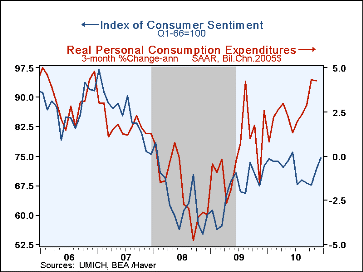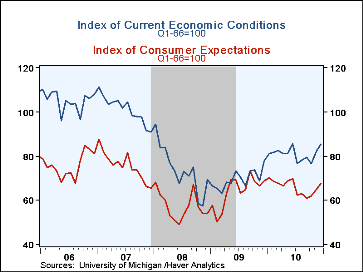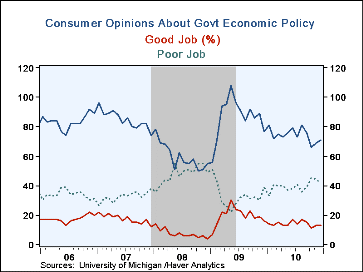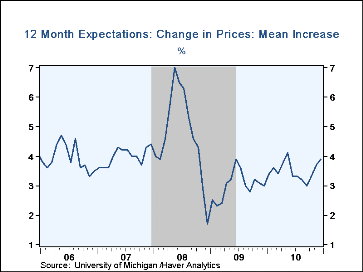 Global| Dec 23 2010
Global| Dec 23 2010Consumer Sentiment Improves
by:Tom Moeller
|in:Economy in Brief
Summary
The consumer held onto the improved mood adopted since this past summer, just in time for the holiday season. During December the University of Michigan Index of Consumer Sentiment rose to 74.5, slightly better than the mid-month [...]
The consumer held onto the improved mood adopted since this past summer, just in time for the holiday season. During December the University of Michigan Index of Consumer Sentiment rose to 74.5, slightly better than the mid-month reading and up from 71.6 last month. It was the highest level since June but it was slightly short of Consensus expectations for 74.7. During the last ten years there has been a 60% correlation between the level of sentiment and the three-month growth in real consumer spending.
The brightening of consumer attitudes was across-the-board. The index of sentiment regarding current economic conditions improved to 85.3 which was its highest since January 2008. That was led by another jump in attitudes about conditions for buying large household goods such as furniture, a refrigerator, stove or a television. Sentiment concerning personal finances slipped m/m but remained improved from last year's low. The index of consumer expectations gained to 67.5 which was its highest in six months. The expected change in personal finances was slightly improved but the m/m increase left the index below this year's high. Expected buying conditions were somewhat firmer.
Expected price inflation during the next year added to its mid-month rise and increased to 3.8%, the highest level since May. Respondents' view of government policy, which may eventually influence economic expectations, improved m/m to a reading of 71; still near its lowest since January 2009. Thirteen percent of respondents thought that a good job was being done by government while 42% thought a poor job was being done, nearly the most since January 2009.
The Reuters/University of Michigan survey data are not seasonally adjusted. The readings are based on telephone interviews with just over 300 households during early-to-mid November. The summary indexes are in Haver's USECON database with details in the proprietary UMSCA database.
| University of Michigan (Q1'66 = 100) | Dec | Nov | Oct | Dec Y/Y% | 2010 | 2009 | 2008 |
|---|---|---|---|---|---|---|---|
| Consumer Sentiment | 74.5 | 71.6 | 67.7 | 2.8 | 71.8 | 66.3 | 63.8 |
| Current Economic Conditions | 85.3 | 82.1 | 76.6 | 9.4 | 81.0 | 69.6 | 73.7 |
| Personal Finances | 80 | 81 | 78 | 9.6 | 79 | 67 | 78 |
| Buying Conditions For Large Household Goods | 140 | 131 | 119 | 9.4 | 130 | 112 | 112 |
| Expectations | 67.5 | 64.8 | 61.9 | -2.0 | 65.9 | 64.1 | 57.3 |
| Expected Change In Personal Finances | 112 | 109 | 110 | -3.4 | 110 | 113 | 107 |
| Business Conditions Next 12 Months | 79 | 71 | 67 | 0.0 | 75 | 65 | 48 |
| Business Conditions Next 5 Years | 78 | 78 | 70 | -3.7 | 79 | 78 | 73 |
Tom Moeller
AuthorMore in Author Profile »Prior to joining Haver Analytics in 2000, Mr. Moeller worked as the Economist at Chancellor Capital Management from 1985 to 1999. There, he developed comprehensive economic forecasts and interpreted economic data for equity and fixed income portfolio managers. Also at Chancellor, Mr. Moeller worked as an equity analyst and was responsible for researching and rating companies in the economically sensitive automobile and housing industries for investment in Chancellor’s equity portfolio. Prior to joining Chancellor, Mr. Moeller was an Economist at Citibank from 1979 to 1984. He also analyzed pricing behavior in the metals industry for the Council on Wage and Price Stability in Washington, D.C. In 1999, Mr. Moeller received the award for most accurate forecast from the Forecasters' Club of New York. From 1990 to 1992 he was President of the New York Association for Business Economists. Mr. Moeller earned an M.B.A. in Finance from Fordham University, where he graduated in 1987. He holds a Bachelor of Arts in Economics from George Washington University.
More Economy in Brief
 Global| Feb 05 2026
Global| Feb 05 2026Charts of the Week: Balanced Policy, Resilient Data and AI Narratives
by:Andrew Cates










